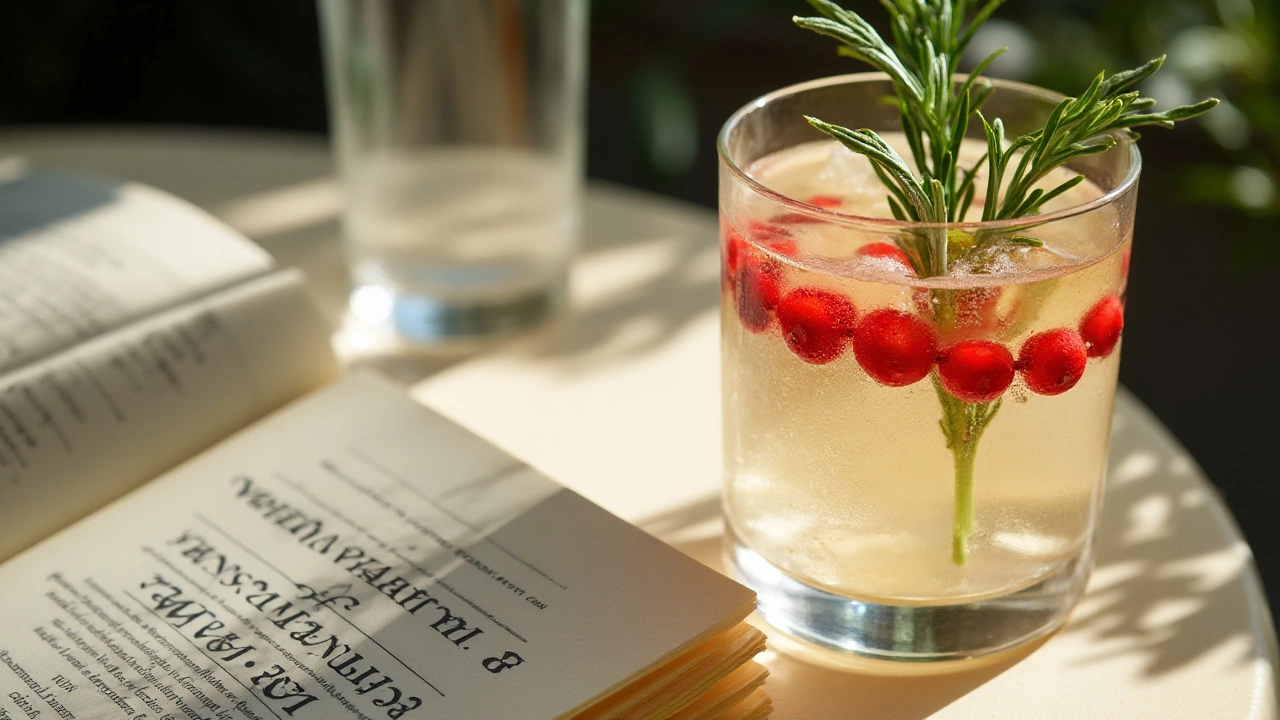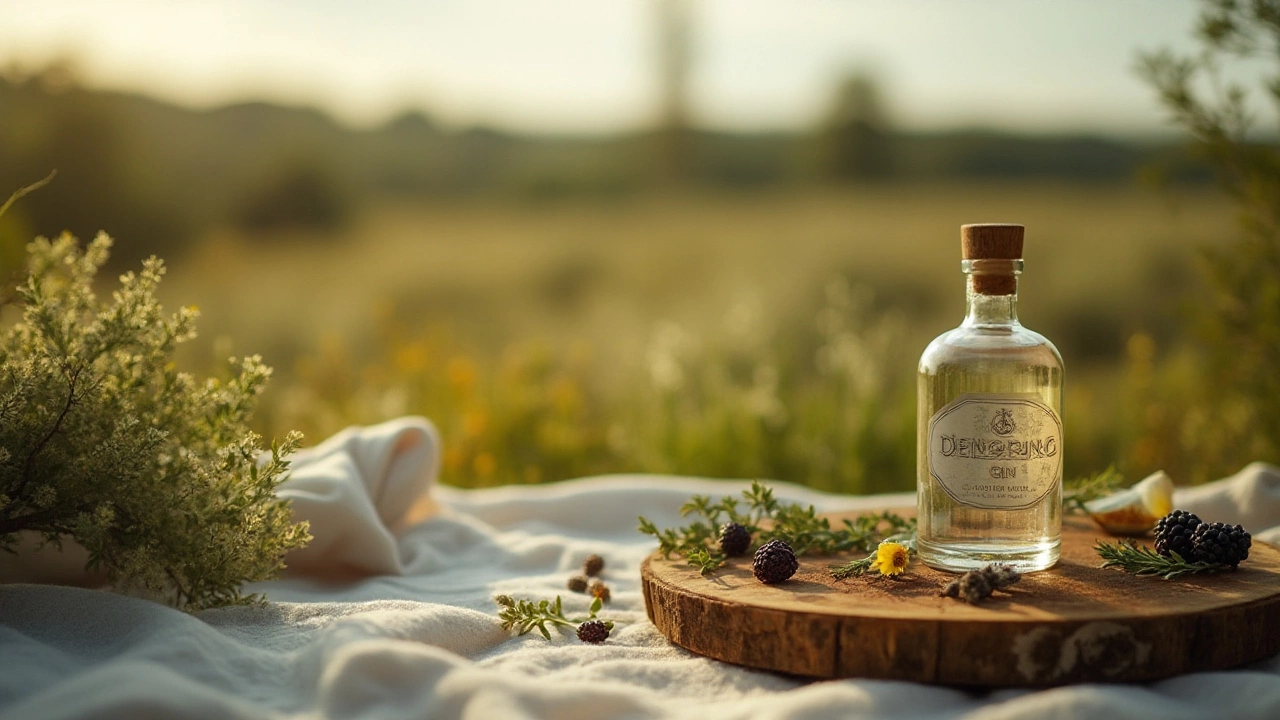There's an age-old allure surrounding the world of gin, a spirit that carries with it a storied past and a riot of botanical flavors. But did you know some claim it isn’t just a delightful concoction but also a potential ally in fighting inflammation? With its roots steeped in history, and the evocative aromas that arise from an impressive array of botanicals, the intrigue doesn't end at the warmth it brings to a night out.
The question of whether gin possesses anti-inflammatory properties is an engaging one. With one of its primary components being juniper berries, often known for their health-associated benefits, we embark on a journey to understand more. As you voyage into this exploration, you might find your next distillery tour filled with fresh insights, adding a sprinkle of curiosity to your sips. And if you choose to explore gin tasting and its potential benefits, doing so responsibly ensures you savor its rich flavors without compromising your well-being.
- The Botanicals Behind Gin
- Anti-Inflammatory Claims and Research
- Experience Gin Distillery Tours
- Responsible Enjoyment and Health Tips
The Botanicals Behind Gin
As we dive into the essence of gin, we find ourselves enveloped in a tapestry of intriguing flavors and aromas defined by its botanical ingredients. Gin is admired globally not just for its refreshing taste but also for its delicate and complex composition of botanicals, which often include juniper berries, coriander seeds, angelica root, and citrus peels. These ingredients contribute to both the gin’s distinctive taste and its potential health benefits, including speculated anti-inflammatory properties.
The presence of juniper berries in gin is pivotal. Known for their role as a diuretic and their high antioxidant content, juniper berries have long been used in traditional medicine. They are believed to help reduce inflammation and have antimicrobial effects. The aromatic berries impart a piney, woodsy flavor to gin, which is both unique and captivating, revealing gin’s complexity as a spirit.
"Gin, with its mosaic of botanicals, isn't just a drink; it's an exploration into the synergy of natural ingredients and their impact on our senses," explains renowned botanist Dr. Felicity Vermeer.
Beyond juniper, other botanicals also play significant roles. For instance, coriander seeds add a subtle spice and citrusy undertones. Historically, coriander has been appreciated for its potential anti-inflammatory and digestive health benefits. Angelica root, meanwhile, offers earthy flavors and acts as a binding agent that harmonizes the other botanicals. Lemon and orange peels contribute zest and additional antioxidants, adding freshness and vibrancy.
The versatility in blending these botanicals is what makes every gin distinct. The varying quantities and types of these ingredients create the endless varieties that gin enthusiasts cherish. Craft distilleries frequently experiment with traditional recipes, adding local herbs and spices to create signature gins that captivate both local and international enthusiasts during gin distillery tours. This process not only enhances the flavors of the gin but may also enhance its suggested health effects.
Each step in the gin-making process offers a potential for innovation, reflecting trends and local tastes. The process itself, which blends science with art, makes for an enthralling experience for those lucky enough to tour a gin distillery. This exploration of varying botanicals and appreciating their exquisite integration only deepens the respect we have for the spirit. Perhaps when you savor your next glass, you'll ponder the journey of flavors that meld seamlessly, thanks to the botanicals behind every batch of gin.
| Common Botanicals | Potential Benefits |
|---|---|
| Juniper Berries | Anti-inflammatory, Antioxidant |
| Coriander Seeds | Digestive Aid, Anti-inflammatory |
| Angelica Root | Harmonizing Agent, Earthy Flavor |

Anti-Inflammatory Claims and Research
When we dive into the world of gin benefits, particularly its potential anti-inflammatory properties, a captivating narrative emerges. The cornerstone of these claims primarily revolves around the illustrious juniper berry—a key ingredient in gin production. Known for its rich history in herbal medicine, juniper berries have long been harnessed for their anti-inflammatory and antioxidant properties. These tiny fruits are packed with flavonoids and essential oils, both known for their medicinal qualities. Flavonoids, for example, are plant compounds thought to provide health benefits through cell signaling pathways and antioxidant effects. This could explain why some hail gin as not just a spirit for the senses but also a boost for the body's internal balance.
A growing body of research has started to lend credence to the idea that our beloved gin could indeed play a role in reducing inflammation. Even though rigorous clinical studies specifically on gin are sparse, research on juniper berries themselves is promising. Studies have pointed out that these berries can help decrease inflammation markers, which are chemicals released by the body when inflammation occurs. Of course, this doesn't mean we should start downing gin by the glass with the expectation of miraculous health remedies. Instead, it posits an interesting premise that moderate consumption might add benefits beyond sheer enjoyment. As always, it’s key to distinguish anecdotal evidence from scientific fact. An example from a study highlighted that a regular intake of juniper berry extract showed a reduction in swelling in test subjects.
An article in the Journal of Ethnopharmacology noted, "Juniper berries contribute to a natural reduction of inflammation through their active biochemical pathways, providing potential insights into their traditional medicinal use."
What's clear is that while the famed berry's potential can't be entirely overlooked, the gin-haunting myths need more scientific exploration. Gin enthusiasts might be pleased to know that the conversation around their favorite spirit isn't just about the taste journey but could also be about the health journey. And while anecdotal experiences should be valued, discerning readers should approach the topic with a mix of skepticism and wonder. Thus, embarking on a gin distillery tour might not just be an expedition into the craftsmanship of the spirit but also an educational outing concerning the justified or inflated health claims that come with it. The take-home message? Enjoying gin with the right mix of joy and moderation just might serve your health in unexpected ways, but it’s best not to rely solely on it as a wellness tonic.

Experience Gin Distillery Tours
Embarking on a gin distillery tour offers more than just a peek behind the curtain of gin production; it immerses you in the rich tapestry of history and craftsmanship that defines this beloved spirit. As you step into the cool, aromatic confines of a distillery, each moment is an opportunity to learn, savor, and appreciate the nuances that make gin a fascinating beverage. The process of turning a collection of raw, botanical ingredients into a harmonious elixir is a spectacle in itself, offering insights into the fine balance of science and art.
Touring a gin distillery often begins with a warm welcome from passionate guides who live and breathe gin. They walk you through the lineage of gin production, painting a vivid picture of its evolution from the medicinal juniper-infused concoctions of yore to the sophisticated, flavorful drinks we enjoy today. You might find yourself catching a whiff of junior local legends such as the infamous ‘Bathtub Gin’ era during Prohibition or how Queen Victoria’s penchant for a gin and tonic popularized it even further. These tales add richness to the tasting part of the tour, where the magic of botanicals comes alive.
An integral part of the experience is learning about the specific ingredients that make gin benefits unique, from the ubiquitous juniper berries to exotic herbs that impart distinctive flavors. Most distilleries even allow you to observe the distillation process. Imagine gleaming copper stills, vats filled with vibrant botanicals, and the heady mix of aromas that hint at the upcoming spirit's character. As you progress through the tour, seizing the opportunity to sample various gin variations provides a deeper understanding of how different methods and ingredients alter the taste and composition of the final product.
For a more engaging perspective, consider renowned gin expert Jared Brown, who once said, ‘Gin is like a chef's salad—each one is different because each distiller gets to choose their own ingredients, which is why it's endlessly fascinating and diverse.’ This philosophy is brought to life during your tour as you taste the spectrum between traditional London Dry to contemporary artisanal blends made with local botanicals.
Finally, the tour wraps up with well-stocked gift shops and beautifully curated tasting rooms. Here, you can savor the fruits of the distilling labor in a controlled, joyous environment, discussing taste notes, textures, and bouquet with fellow enthusiasts. Often, you're given the chance to purchase small-batch gins exclusive to the distillery, providing a perfect keepsake of your journey into the world of gin. To enrich your visit, some distilleries also host workshops or mixology classes—where aspiring mixologists can learn to craft the perfect gin and tonic, harnessing the subtle complexities of this cherished spirit. So, whether you are a newbie looking to cultivate your palate or a seasoned connoisseur aiming to expand your collection, a distillery visit gives you insights that can make your gin-drinking journey delightfully more profound.

Responsible Enjoyment and Health Tips
Enjoying gin should be an experience that blends pleasure with consciousness, especially when its potential health benefits are considered. For those interested in the anti-inflammatory drinks aspect, moderation is key. While the botanical elements, like juniper berries, present a case for health benefits, it's important to bear in mind that alcohol consumption should be limited. According to the Dietary Guidelines for Americans, moderate drinking is defined as up to one drink per day for women and up to two for men. If you're venturing on a gin distillery tour, this knowledge can guide your tasting choices.
Health experts often warn about the dangers of excessive drinking, which may negate any purported benefits of ingredients found in gin. As with any spirit, the balance lies in understanding when to stop. The benefits of juniper and other botanicals may be undermined by alcohol's health risks, like liver damage or other illnesses if consumed excessively.
"Drinking in moderation could be a part of a healthy lifestyle, but it isn't an excuse to overindulge," says Dr. Samantha Jones, a leading nutritionist.Such perspectives are crucial as they align with scientific understanding of alcohol's impact.
While partaking in a gin adventure, consider complementing tastings with a substantial meal rich in vegetables and lean proteins. Foods like salmon, leafy greens, and nuts, high in anti-inflammatory properties, can help buffer alcohol's effects.
Practical Tips for Safe Gin Enjoyment
- Pair gin with food that has anti-inflammatory benefits.
- Stay hydrated by alternating gin with water during your distillery visits.
- Consider the time of day; evening enjoyment might affect sleep patterns.
- Never drive under the influence; plan for alternative transportation options.
- Listen to your body; if you feel unwell, seek medical advice.
Additionally, awareness about specific health conditions that might be sensitive to alcohol is crucial. Consult your healthcare provider if you're unsure about how gin might interact with your health. This proactive approach aligns with sensible drinking habits and can help prevent adverse health consequences. Thus, while the idea of gin benefits as a health boost may appeal, it's crucial to approach it with an informed and balanced perspective.


